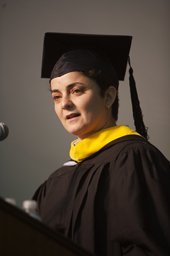Lumah Mufleh at JSC

Lumah Mufleh at JSC
Luma Mufleh, “Fugees” Soccer Champion Coach Named 2007 JSC Commencement Speaker
April 1, 2007
Celebrated refugee soccer coach Luma Mufleh will be the honored guest and commencement speaker at Johnson State College on Saturday, May 19, 2007 at 2 p.m.
Affectionately known as “Coach Luma,” the 31-year-old Jordan immigrant was heralded recently by The New York Times and National Public Radio for her role in coaching soccer to refugees resettled in Clarkston, Georgia.
The soccer program, called the Fugees short for refugees (not to be confused with the hip-hop band of the same name) has provided hope, direction and recognition for refugee children and their families.
‘We are delighted to host Luma Mufleh at Commencement to celebrate her work helping refugees resettled in the United States,” said JSC President Barbara E. Murphy. “Luma’s work exemplifies a life being lived in service to the community. I believe her message will resonate with the focus on engagement, public voice and service to the community that our students have experienced at Johnson State College. With more than 4,000 refugees in Vermont, we can learn many lessons from her compassion, commitment and creativity.”
Nearly 20,000 refugees were resettled in Clarkston between 1996 to 2001, due to its access to public transportation, available housing, and proximity to the Atlanta job market.
Mufleh was coaching a soccer class of middle-class girls in Atlanta when she discovered a neighborhood of refugee children playing ragtag soccer on Clarkston streets. In 2004, she organized soccer practices for the Clarkston refugees, with three teams of boys aged 9 to 17 years, divided into age groups.
Her mission is to give voice to the experience of refugees in America, especially those from war-ravaged countries around the world, from Afghanistan, Iraq, Sudan, Somalia, Congo, Liberia, Gambia, Burundi, Bosnia and Kosovo. Many of the refugees endured unimaginable hardship: squalor and disease in refugee camps, separation from family, and were witness to brutal killings.
Despite their newfound sanctuary, Mufleh’s charges have suffered discrimination and abuse because of their presence and activities. Even Clarkston mayor Lee Swaney refused to allow the Fugees access to the unused town playing field, but eventually relented after protests. The players and coach have also received support, and respect for their success.
In just three years, Mufleh led the Fugees to tie their soccer division’s Tornado Cup last season against Concord Fire, Atlanta’s most elite and expensive soccer academy.
Mufleh has also reached out to other members of Clarkston’s refugee community. On learning that refugee women earned low wages, she started a house and office cleaning company called Fresh Start, offering a $10-an-hour minimum starting wage and 50-cent an hour yearly increases. The business includes training and professional development courses cleaning skills, worker health and safety, computer skills, English as a Second Language, and finance and accounting and it hopes to offer landscaping, laundry and food services in the future.
The success of Mufleh’s refugee programs attracted significant media coverage that led to a $3 million movie and book deal with Universal Studios to tell the Fugees story.
When Mufleh returned in February to her alma mater, Smith College, 10 years after graduating with studies in anthropology and government, she was greeted by a packed lecture hall, and received an award of distinction as part of the college’s celebration of National Girls and Women in Sports Day.
At the lecture, Mufleh said she had four main goals: Have a movie made about the Fugees’ story; write a book about her experiences; return to Smith College; and wait for Oprah Winfrey to call.
More than 900,000 refugees have come to the US since 1993. Figures from the Vermont Refugee Resettlement Program show there are more than 4,000 refugees in Vermont as of November 2006.